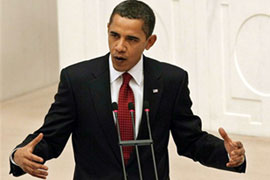No charges over CIA waterboarding
US president says those who used interrogation technique will not face prosecution.

The documents include justice department memos from 2002 and 2005 approving the CIA’s use of interrogation techniques including “waterboarding” which simulates the sensation of drowning.
The memos document in detail techniques lawyers believed would not break laws against torture.
| In depth | ||
|
As well as waterboarding, the memos describe the repeated slamming of a prisoner’s head against a padded wall, face-slapping and sleep deprivation.
Withholding food, forcing prisoners to stand in uncomfortable positions for long periods, confinement in a cramped box and putting insects into the box with a prisoner who had a strong fear of insects were also authorised by the documents.
A US federal judge ordered the release of the memos following a lawsuit filed by the American Civil Liberties Union, but the CIA reportedly wanted sensitive information on the memos to be withheld.
Diane Feinstein, the chair of the senate intelligence committee, said the memos showed the Office of Legal Counsel had “inaccurately interpreted Article III of the Geneva Conventions, the Convention Against Torture, and US law”.
“Waterboarding and slamming detainees head-first into walls, as described in the OLC opinions, clearly fall outside what is legally permissible,” Feinstein said in a statement.
Prosecution ‘unfair’
Eric Holder, the US attorney-general, said in a statement that the Obama administration had “made clear from day one” that it did not condone torture.
| Related |
“We are disclosing these memos consistent with our commitment to the rule of law,” he said.
But he added: “It would be unfair to prosecute dedicated men and women working to protect America for conduct that was sanctioned in advance by the justice department.”
The CIA has admitted using waterboarding on three detainees at the Guantanamo Bay prison camp in Cuba, including Khalid Sheikh Mohammed, the suspected mastermind of the September 11, 2001, attacks in the US.
‘Torture’ controversy
The harsh interrogation methods have been criticised by rights groups as torture, and both Holder himself and Leon Panetta, the director of the CIA, have said they consider waterboarding to be torture.
 |
| Obama said intelligence agents had carried out waterboarding ‘in good faith’ [AFP] |
Panetta told the US congress last week that the secret sites where CIA prisoners were waterboarded and interrogated by other harsh means were to be closed.
However, he said he had no intention of prosecuting any CIA employees for their role in a secret programme that was deemed legal at the time.
In an interview with Al Jazeera’s Fault Lines programme, Richard Armitage, a former deputy secretary of state under George Bush, Obama’s predecessor, said he hoped he would have resigned had he known that detainees were being waterboarded.
“Torture is a matter of principle as far as I’m concerned. I hope, had I known about it at the time I was serving, I would’ve had the courage to resign,” he said.
Shortly after taking office, Obama ordered the Guantanamo prison camp closed within a year and also signed an order instructing the CIA to abide by rules set out in the US army field manual, saying the US will never again condone torture.
The release of the memos comes as US media reported on Thursday that the US National Security Agency had overstepped its remit in spying on US citizens in recent months.
